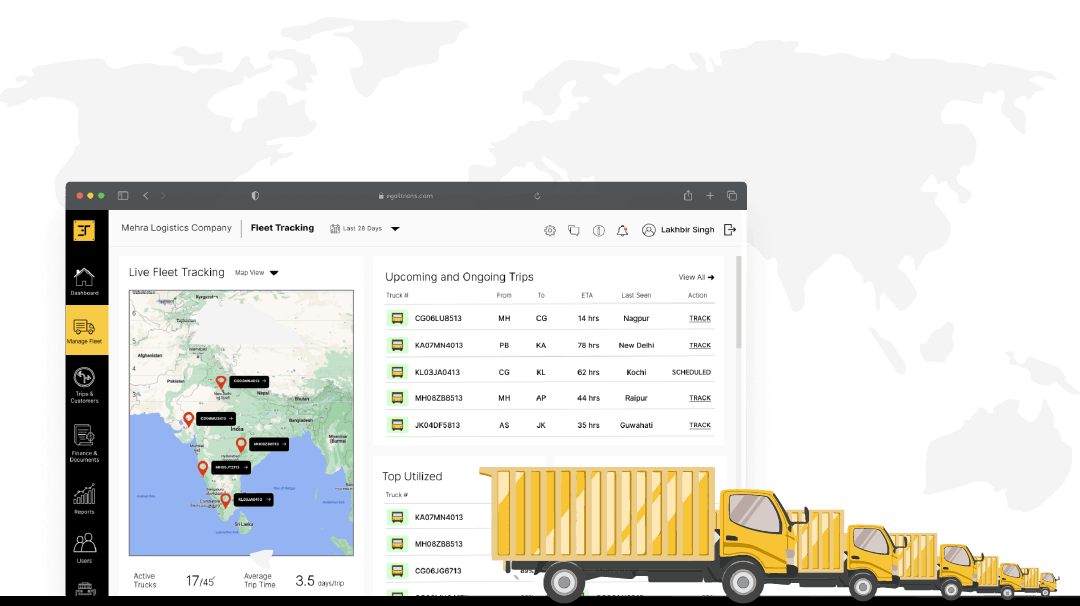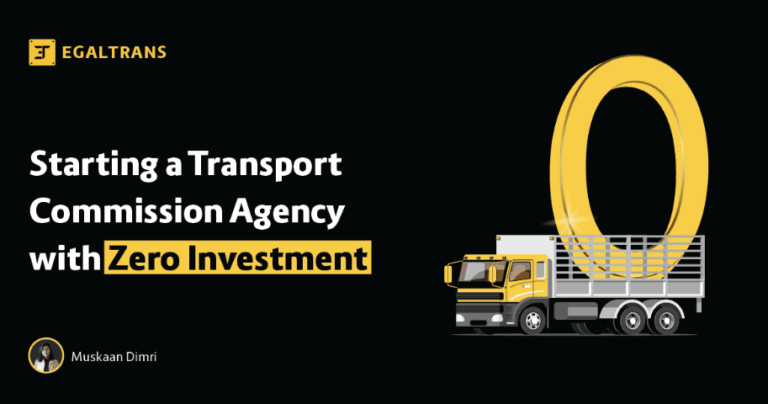As the Indian trucking industry continues to evolve, fleet owners are faced with both challenges and opportunities for growth. Small fleet owners, in particular, encounter unique obstacles that can hinder their expansion beyond 10 trucks. Operating in a dynamic and competitive industry, small fleet owners face hurdles such as operational inefficiencies, reliance on intermediaries like freight brokers, and limited visibility into their trucking operations. These challenges not only hinder their ability to secure direct business from customers but also impede efforts to scale operations efficiently.
In this article, we delve into the common obstacles faced by Indian truck fleet owners and provide strategic insights on overcoming these barriers to achieve sustained growth beyond the 10-truck mark. We’ll analyze challenges and provide practical insights on how Indian fleet owners can overcome them to achieve sustainable growth.
Identifying the Challenges Faced by Small Truck Fleet Owners
Small truck fleet owners confront a multitude of challenges that can impede their operational efficiency and hinder business growth. To scale successfully, small truck owners must address these challenges strategically, embracing technology, fostering direct client relationships, and implementing efficient operational practices.
a. Operational Inefficiencies:
Managing a small fleet often involves manual and time-consuming processes, leading to operational inefficiencies. Due to lack of operational costs there is a lot of manual work which can also lead to mistakes and inaccurate data. Lack of real-time visibility into trucking operations can result in inefficient route planning, fuel wastage, and delays.
b. Dependency on Freight Brokers:
Small fleet owners commonly rely on freight brokers to connect them with potential clients, limiting their direct access to businesses and reducing profit margins. Freight brokers act as intermediaries, connecting trucking companies with shippers in need of transportation services. While this arrangement provides access to clients, it also comes with the drawback of reduced profit margins, as brokers typically take a percentage of the transportation fees. As fleet owners aim to grow and maximize profitability, finding a balance between brokered contracts and establishing direct customer relationships becomes crucial.
c. Driver Shortages:
Finding and retaining qualified drivers is a persistent challenge in the trucking industry. As fleets expand, the demand for skilled drivers increases, and competition for talent becomes fierce. The shortage not only results in heightened labor costs due to competitive wage demands but also introduces operational delays and potential disruptions in meeting contractual commitments.
d. Supply Chain Disruptions:
External factors such as natural disasters, geopolitical events, or global pandemics can disrupt supply chains, affecting the demand for transportation services and creating uncertainties for trucking businesses.This unpredictability can affect the stability of contracts and hinder the ability of fleet owners to secure a consistent flow of business. Moreover, during times of disruption, clients may prioritize cost-cutting measures, affecting transportation budgets and reducing the number of contracts available to expanding fleets.
Addressing this issue becomes paramount for sustainable fleet growth and meeting the escalating demands of the industry.
How to Overcome Challenges and Improve Truck Business in India
Fleet owners wondering how can they grow their business and achieve a profitable operation, can follow simple yet important steps to expand their transport business.
a. Networking and Relationship Building:
Attend industry events, join business associations, and network with potential clients to establish direct relationships. Personal connections often lead to long-term partnerships. These connections can lead to direct business opportunities, reducing dependency on intermediaries like freight brokers. Moreover, networking provides a platform for sharing experiences and best practices, enabling fleet owners to learn from the successes and challenges of others in the field. Through collaborative partnerships and a robust network, fleet owners can access a broader range of resources, expertise, and support, contributing significantly to the successful expansion of their operations.
b. Automating Truck Operations:
The automation of truck operations stands as a cornerstone in overcoming the challenges associated with fleet expansion. Implementing advanced fleet management software, telematics systems, and digital documentation not only streamlines operational processes but also enhances efficiency and scalability. By embracing technology, fleet owners can minimize manual errors, enhance communication, and respond proactively to potential issues. This level of automation is particularly crucial during the expansion phase, where the demand for streamlined operations is heightened. As the fleet grows, automation becomes a key driver in managing increased complexities, ensuring a smooth transition, and positioning the business for sustained growth.
c. Implementing Fleet Management Software:
The implementation of Fleet Management Software (FMS) emerges as a strategic imperative in overcoming the challenges associated with fleet expansion. FMS provides a comprehensive solution for streamlining and optimizing various aspects of trucking operations. Through real-time tracking, route optimization, and automated scheduling functionalities, fleet owners gain enhanced visibility and control over their expanding fleet. This technology not only minimizes the risk of manual errors but also promotes operational efficiency by reducing downtime and fuel wastage. Furthermore, FMS facilitates data-driven decision-making, enabling fleet owners to make informed choices regarding route planning, maintenance schedules, and resource allocation. As the fleet grows, the scalability of FMS ensures seamless integration, adapting to the evolving needs of an expanding operation.
d. Maintaining Disciplined Financial Hygiene:
Maintaining disciplined financial hygiene is a cornerstone in successfully overcoming the challenges associated with fleet expansion. As a fleet grows, financial complexities intensify, requiring meticulous budgeting, expense tracking, and strategic financial planning. Establishing a comprehensive budget and financial forecast becomes imperative to navigate increased operational costs and capital expenditures. By closely monitoring expenses and revenues, fleet owners can identify areas for optimization and ensure efficient resource allocation. This disciplined financial approach also involves educating key decision-makers on financial management principles, fostering a culture of fiscal responsibility within the organization. As the fleet expands, adherence to disciplined financial practices not only safeguards the financial health of the business but also builds a solid foundation for sustained growth, enabling fleet owners to make informed and strategic decisions in a dynamic and competitive market.
e. Building Partnerships with Other Fleet Owners:
Collaboration within the industry provides opportunities to share resources, pool expertise, and collectively tackle operational complexities. By forming alliances, fleet owners can tap into complementary strengths, whether it be specialized services, regional expertise, or shared technology solutions.
- Collaborative Ventures: Explore opportunities for collaboration with other fleet owners to share resources, reduce costs, and expand service offerings.
- Information Sharing Networks: Join industry networks or associations where fleet owners exchange insights, share best practices, and explore potential partnerships.
- Specialization and Collaboration: Identify areas of specialization within your fleet and collaborate with other fleet owners who specialize in complementary services to offer comprehensive solutions to clients.
For Indian fleet owners looking to surpass the 10-truck threshold, a strategic approach is essential. By addressing operational challenges, reducing dependency on freight brokers, embracing automation, maintaining financial discipline, and fostering partnerships, fleet owners can position themselves for sustainable growth in an evolving and competitive market. More than anything, use of technology from the very beginning enables fleet owners to think of business scale and grow efficiently.







[…] recent study by the Central Institute of Road Transport (CIRT), 77% of transport companies have a small fleet of less than ten trucks. Most of them are independent truck drivers and Only 6% of trucks are owned by companies with 20 […]